In this article:
Eczema often triggers an intense or persistent itch, and scratching it will only worsen the problem. Scratching may provide immediate relief from the itch, but it’s always short-lived and the itch comes back stronger.
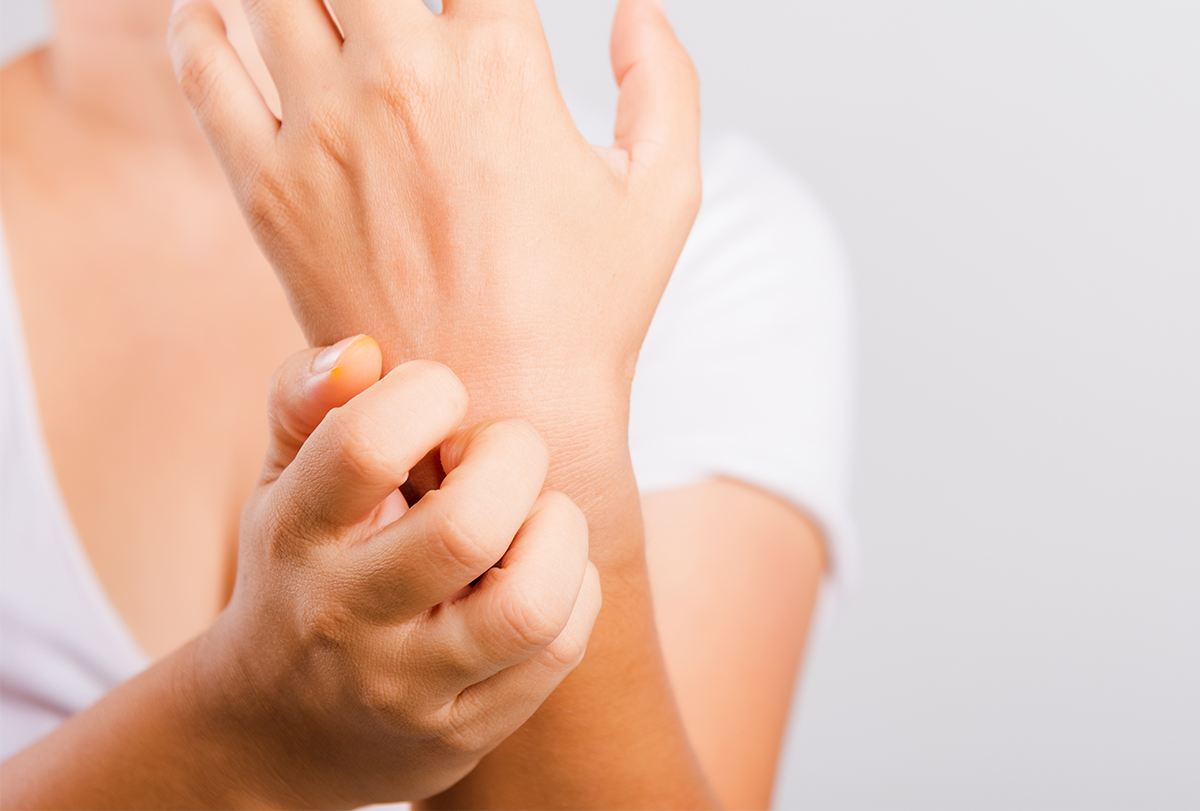
This is because the immune system perceives the act of scratching as damaging to the body and heightens the inflammatory response to counter this external threat. It is this underlying inflammation that makes your skin itch. Thus, scratching perpetuates and intensifies skin inflammation, which results in uncontrollable itching.
Also, the repeated friction of the fingernails can physically damage and even rupture the skin tissue. The skin then tries to repair itself. In doing so, it forms scar tissue over the wound to protect it from further damage or foreign irritants.
Thus, the affected skin becomes dark, leathery, and thickened to form stubborn scars. These scars can make people with eczema extremely self-conscious about their appearance, in turn becoming a source of stress, which is a major trigger for eczema flare-ups.
Scratching can also transfer germs from the fingers to the irritated skin, which can lead to infection. Eczema treatment aims to curb the inflammation and minimize the itch to keep you from scratching your skin and thus prevent scarring.
Once the scars form, your doctor may recommend ointments, clinical procedures, and even plastic surgery to make them less visible. However, some scars may never disappear completely, even after using these interventions.
Home Remedies for Eczema
Try these home remedies that employ natural ingredients to heal and soothe your skin. However, they are not meant to be mainstay treatment for eczema lesions or scars. These remedies are to be used as complementary tools in conjunction with the doctor-recommended treatment.
Moreover, a particular remedy may not yield the same results for everyone. You may have to try many different remedies to find the ones that work best for your skin type and condition.
Note: Conduct a patch test before trying any of these topical remedies to rule out any sensitivity or allergic reaction.
1. Oatmeal
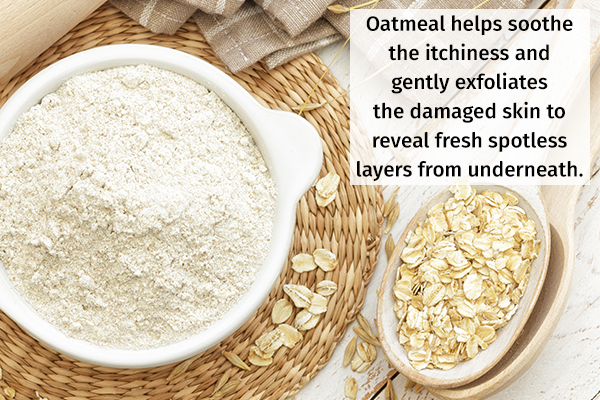
Oatmeal is widely recognized for its moisturizing and anti-inflammatory properties that help repair and strengthen the skin barrier function.
It helps soothe the itchiness and gently exfoliates the damaged skin to reveal fresh spotless layers from underneath. This helps diminish the appearance of eczema scars over time. (1)
You can use various colloidal oatmeal-based skin products to relieve the discomfort associated with eczema-ridden skin or soak in an oatmeal bath to soothe your skin and relax your body.
How to use:
- Blend 2 cups of ground oatmeal into fine powder and add it to your lukewarm bathwater. Soak in it for half an hour.
- People with severe eczema or scarring are advised to go for at least two oatmeal baths a day.
Note: Make sure that the oatmeal is finely ground or else it will sink to the bottom of the tub or clog your drain.
2. Aloe vera
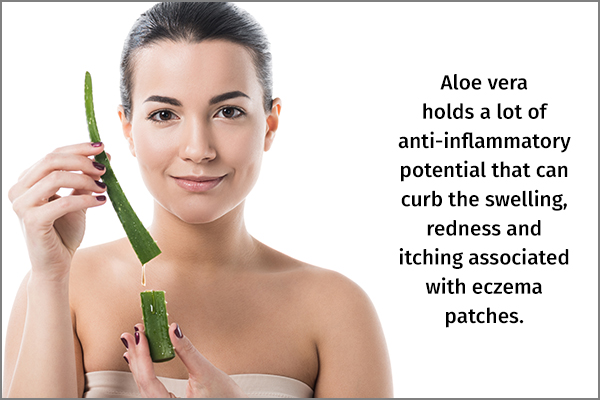
Aloe vera is a natural skin healer that can find some use in alleviating the irritation and scarring associated with eczema. Its hydrating gel is readily absorbed to deeply moisturize your dry, irritated skin.
Aloe vera also holds anti-inflammatory properties that can curb the swelling, redness, and itching brought about by eczema. Moreover, aloe vera gel works as an antimicrobial agent that helps keep the skin infection-free.
Topical aloe vera can also promote faster skin repair to gradually lighten the dark eczema scars. (2)
How to use:
- Scoop out the gel from the aloe vera leaves and apply it all over the affected skin a few times daily. If you don’t have an aloe vera plant at home, consider buying good-quality, unadulterated aloe gel.
- Mix equal amounts of pure aloe vera gel and vitamin E oil to form a thin paste. Apply the paste to the affected areas overnight, and rinse it off in the morning with warm water. Repeat daily.
3. Apple cider vinegar
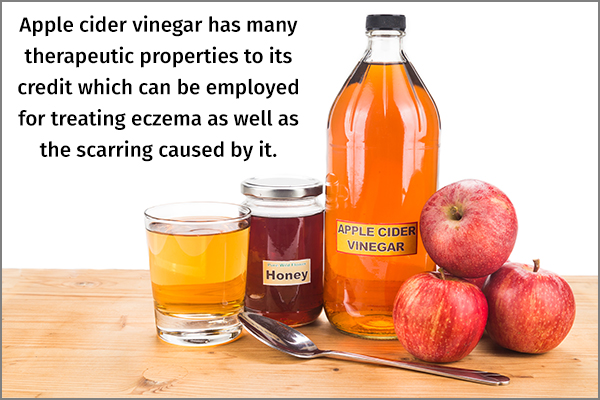
Apple cider vinegar (ACV) has many therapeutic properties to its credit, which can be employed for treating eczema as well as the scarring caused by it.
For starters, this weak acid works as an astringent that can cleanse your skin and bring down inflammation. It also helps keep your skin environment slightly acidic and thus inhospitable for microbial growth.
Moreover, ACV exhibits significant antifungal and antibacterial properties that can keep skin infections at bay. (3) You must use raw, unfiltered apple cider vinegar to get the best results, but only after diluting it in water.
How to use:
- Pour 2 teaspoons each of ACV and raw honey in a glass of water and mix the ingredients well to make an immunity-boosting tonic, which should ideally be consumed in the morning.
- Mix equal parts of vinegar and water. Apply this solution to the affected skin to reduce itchiness and dryness.
4. Shea butter
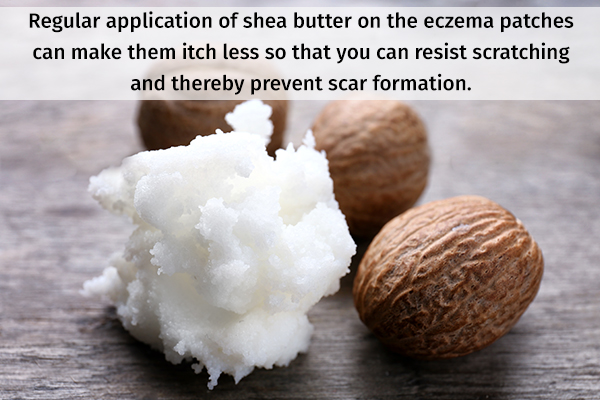
Shea butter is richly endowed with vitamins A and E, both of which are mighty antioxidants that help protect the skin from damage and also facilitate its regeneration/repair. It also works as an intensive moisturizer to hydrate and soothe dry, irritated skin.
Regular application of shea butter on the eczema patches can make them itch less so that you can resist scratching and thereby prevent scar formation. It also helps stimulate new cell formation in the area to gradually fade the existing scars, if any. (4)
How to use:
- Apply shea butter to the affected skin. The best time to do so is before going to bed so that it stays on your skin overnight and is sufficiently absorbed.
- You can also add a few drops of lemon juice to the shea butter for added skin-lightening effects.
Note: Cocoa butter also has a high vitamin E content, which makes it a good alternative for shea butter.
Eczema: Dos and Don’ts
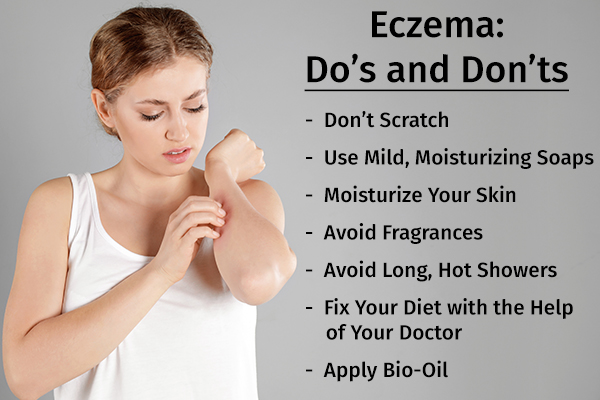
Here are a few self-care measures that can help relieve eczema symptoms and avoid frequent flare-ups:
1. Don’t scratch
As discussed earlier, you must resist the urge to scratch the itchy eczema lesions to avoid scarring and infection. If the itch becomes unbearable, consult a doctor for appropriate treatment. In the meantime, you can gently rub or pat the itchy skin with clean hands.
2. Don’t use fragrances
Perfumes, colognes, and deodorants contain harsh chemicals that can aggravate your eczema symptoms. The same goes for scented skin and bath products as well as detergents that can irritate your sensitive skin. Thus, it’s best to avoid them and use only fragrance-free skin products.
3. Don’t take long, hot showers
Washing your skin with hot water removes its inherent moisture and renders it quite dry. Prolonged exposure to water can also strip the lipids from your skin and cause dryness. Thus, if you already suffer from severe skin dryness, only bathe with lukewarm water for 5–10 minutes and not more than once a day.
Once you are done bathing, don’t rub your skin with a towel but pat it dry. Apply a moisturizer when the skin is still damp but not soaking wet.
4. Do use mild, moisturizing soaps
Eczema triggers extreme skin dryness, which is the source of a lot of itching and irritation.
Normal soaps and cleansers can further dry out your skin and worsen these symptoms. This is because they come with certain chemicals that strip the natural oils from your skin over repeated use.
Thus, look for soaps that are chemical-free and moisturizing. Replace your normal soaps with pH-balanced soaps (syndet bars). Ask your doctor to recommend suitable options.
5. Do moisturize your skin
Dry skin is less elastic and more vulnerable to tearing. Both these factors can contribute to scar formation. Thus, you need to apply intensely hydrating emollients all over the affected skin to keep it soft, moist, supple, and itch-free.
Moisturizing your irritated skin daily is one of the most basic steps in managing and preventing eczema flare-ups.
Emollients come in the form of lotions, creams, and ointments, but the last two provide deeper skin hydration than the first and are therefore recommended for those with eczema.
6. Do fix your diet with the help of your doctor
Certain foods such as eggs and cow’s milk are known to trigger inflammation and thereby eczema symptoms.
But these foods are also great sources of calcium, calories, and protein, all of which are needed for growth, especially in young children. Thus, it may not be wise to eliminate these nutritious foods from your diet altogether.
If you suspect that a particular food is making your condition worse, talk to your doctor about it. He/she will recommend appropriate dietary modifications that will help keep eczema under control without compromising your nutritional needs.
7. Do apply Bio-Oil
Bio-oil is highly recommended for soothing irritated skin and diminishing the appearance of scars. It moisturizes the skin and forms a protective cover over it to ward off external irritants.
Do Eczema Scars Go Away?
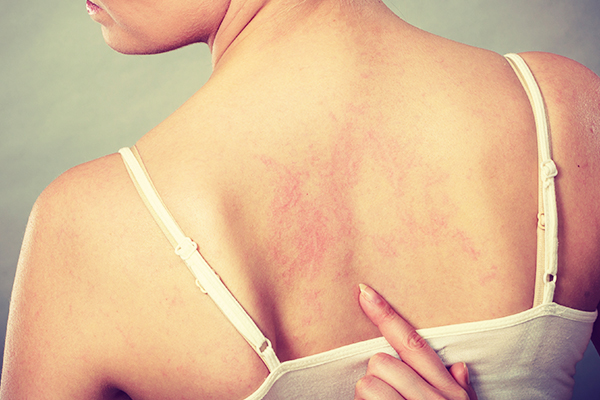
Eczema scars may or may not go away completely, largely depending on the extent and depth of tissue damage. Light scars usually fade with time if you treat them with appropriate skin care products.
You must also proactively stop new scar formation by keeping your eczema under control. This mainly requires steering clear of any known eczema triggers and sticking to your doctor-prescribed treatment.
Dark, extensive, or aggressive scarring is much more difficult to treat. However, several interventions can fade these scars to a great degree, but not completely. Even plastic surgery can prove ineffective for complete scar removal.
For what it’s worth, you can always use makeup to conceal the faint scar that’s left behind after treatment.
Final Word
Eczema is typically a long-lasting condition without a cure, but it can be effectively managed through doctor-prescribed medication and home care.
Always consult your doctor before trying any new remedy or intervention for your eczema. Misguided self-treatment can end up worsening your condition and triggering other serious complications.
The above-mentioned remedies are largely safe and have delivered positive results for a considerable number of general users. But this does not mean that they are magic bullets that can make your scars disappear overnight.
It takes a long time for your skin to heal, and these remedies can only accelerate that process to a certain degree. You will have to use them regularly for many weeks before you start noticing a difference.
Home remedies do not promise guaranteed or absolute results, but they may help minimize the appearance of eczema scars and prevent new ones from forming.

- Was this article helpful?
- YES, THANKS!NOT REALLY


